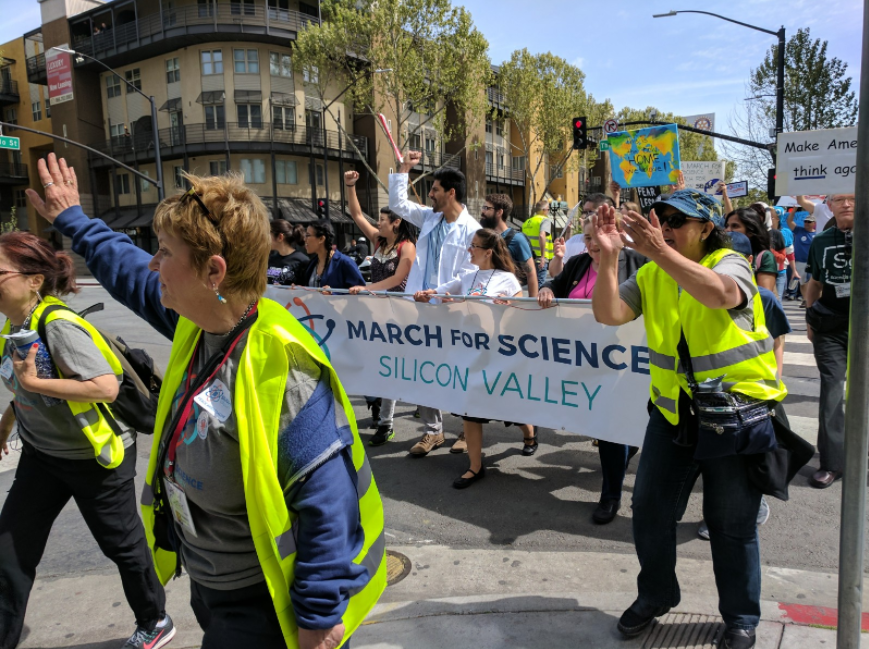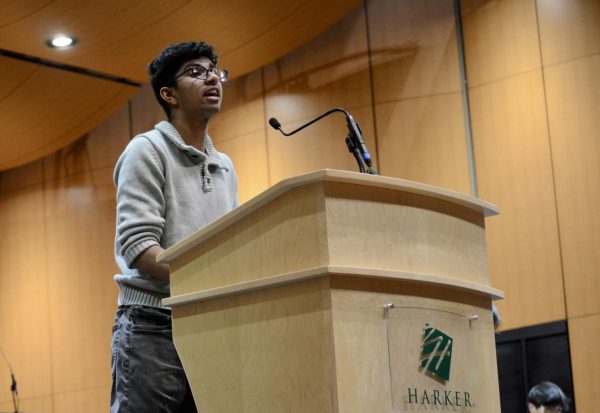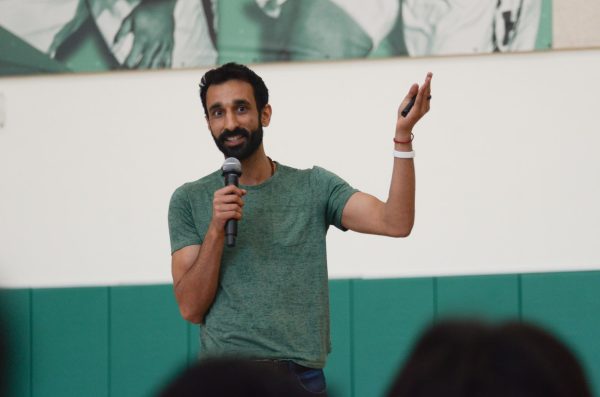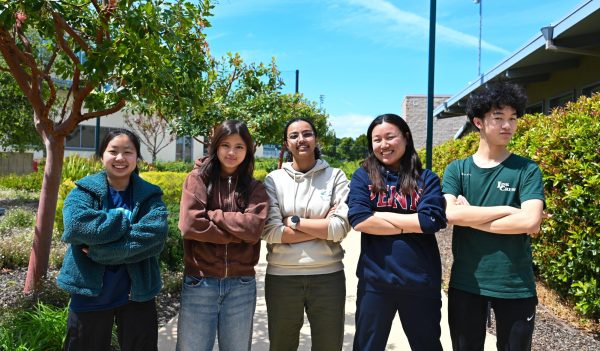Trump to back out of Paris Agreement
Protestors participating in the March for Science in San Jose, held last month, carry signs and chant slogans. Americans have actively campaigned for better awareness of climate change in the wake of Trump’s announcements of his lack of support for the EPA.
June 1, 2017
President Trump plans to pull the United States out of the Paris Agreement, he announced this afternoon at the White House.
“The United States will withdraw from the Paris Climate Accord but begin negotiations to re-enter either the Paris Accord or really an entirely new transaction on terms that are fair to the United States,” Trump said to on-site reporters earlier today. “So we are getting out but we are starting to negotiate, and we’ll see if we can make a deal that’s fair.”
Trump’s decision effectively reverses presidential predecessor Barack Obama’s verdict of entering the international cooperative battle against climate change.
“I feel like the movement is going to go forward no matter what happens, but what it does is it gives countries who may have challenges in meeting some of the emission reduction limits an excuse to not adhere to what they had agreed to do,” Green Team advisor Diana Moss said. “I don’t think [the fight against climate change is] a train that can be stopped; I just think that symbolically, it’s really really embarrassing for our country that we are not taking the leadership position here.”
The Paris Agreement, which first went into effect during November of last year, has been ratified by a total of 147 countries. The signing of the pact marks a pledge to adopt green energy sources, cut down on climate change emissions and limit the rise of global temperatures. While it acknowledges that climate change is unavoidable, it establishes several concrete objectives that countries should aim for.
Goals of the agreement include reducing global temperatures to 2 degrees Celsius above pre-industrial levels and allocating $100 billion to aid the switch from fossil fuels to more environmentally friendly energy sources. Countries in the accord are aiming to accomplish these feats by 2020, five years after first talks on the agreement.
Prior to the ratification of the Paris Agreement, representatives from 196 countries first deliberated the aims of the plan at the 21st Conference of the Parties of the United Nations Framework Convention on Climate Change (UNFCCC) in Paris.
Trump’s removal of the United States from the Paris Agreement also allows Americans, the second biggest contributor to carbon dioxide emissions, to reject the guidelines outlined by the United Nations—for example, to cutting carbon emissions by between 26 and 28 percent from 2005 levels by 2025.
During his time on the campaign trail, Trump expressed his wish to renege on Obama’s verdict of joining the Paris Agreement by arguing that the regulations set were not “favorable for the United States.” He has also discussed concerns that the agreement could potentially weaken the American economy by taking away jobs that involve fossil fuels, such as the coal industry.
“I think it’s a publicity stunt for Trump to appease his base, which appears not to believe that climate change is a pressing issue. He runs on a theme of ‘America first’—to him, the Accord was unfair because ‘China gets to keep doing coal’ and ‘India gets to keep all its money’ and ‘America doesn’t get to do anything,’” chemistry teacher Andrew Irvine said. “It’s ultimately not going to change anything; we are going to address climate change in the future.”
According to the process for withdrawal outlined in the Paris Agreement, the United States may need a total of four years to carry out a complete departure from the international coalition—leaving the next round of voters with considerable say in how Americans battle climate change in the future.
































![Setter Emma Lee (9) sets the ball to the middle during the match against Pinewood on Sept. 12. “[I’m looking forward to] getting more skilled, learning more about my position and also becoming better friends with all of my teammates, Emma said.](https://harkeraquila.com/wp-content/uploads/2023/09/DSC_4917-2-1200x795.jpg)















































































![“[Building nerf blasters] became this outlet of creativity for me that hasnt been matched by anything else. The process [of] making a build complete to your desire is such a painstakingly difficult process, but Ive had to learn from [the skills needed from] soldering to proper painting. Theres so many different options for everything, if you think about it, it exists. The best part is [that] if it doesnt exist, you can build it yourself, Ishaan Parate said.](https://harkeraquila.com/wp-content/uploads/2022/08/DSC_8149-900x604.jpg)


![“Animation just clicked in a way. I had been interested in art, but that felt different. [Animation] felt like it had something behind it, whereas previous things felt surface level. I wasnt making that crazy of things, but just the process of doing it was much more enjoyable, Carter Chadwick (22) said.](https://harkeraquila.com/wp-content/uploads/2022/08/Screen-Shot-2022-08-16-at-9.44.08-AM-900x598.png)


![“When I came into high school, I was ready to be a follower. But DECA was a game changer for me. It helped me overcome my fear of public speaking, and its played such a major role in who Ive become today. To be able to successfully lead a chapter of 150 students, an officer team and be one of the upperclassmen I once really admired is something Im [really] proud of,” Anvitha Tummala (21) said.](https://harkeraquila.com/wp-content/uploads/2021/07/Screen-Shot-2021-07-25-at-9.50.05-AM-900x594.png)



![“[Volleyball has] taught me how to fall correctly, and another thing it taught is that you don’t have to be the best at something to be good at it. If you just hit the ball in a smart way, then it still scores points and you’re good at it. You could be a background player and still make a much bigger impact on the team than you would think,” Anya Gert (’20) said.](https://harkeraquila.com/wp-content/uploads/2020/06/AnnaGert_JinTuan_HoHPhotoEdited-600x900.jpeg)

![“Im not nearly there yet, but [my confidence has] definitely been getting better since I was pretty shy and timid coming into Harker my freshman year. I know that theres a lot of people that are really confident in what they do, and I really admire them. Everyones so driven and that has really pushed me to kind of try to find my own place in high school and be more confident,” Alyssa Huang (’20) said.](https://harkeraquila.com/wp-content/uploads/2020/06/AlyssaHuang_EmilyChen_HoHPhoto-900x749.jpeg)













![“My slogan is ‘slow feet, don’t eat, and I’m hungry.’ You need to run fast to get where you are–you arent going to get those championships if you arent fast,” Angel Cervantes (12) said. “I want to do well in school on my tests and in track and win championships for my team. I live by that, [and] I can do that anywhere: in the classroom or on the field.”](https://harkeraquila.com/wp-content/uploads/2018/06/DSC5146-900x601.jpg)

![“I think getting up in the morning and having a sense of purpose [is exciting]. I think without a certain amount of drive, life is kind of obsolete and mundane, and I think having that every single day is what makes each day unique and kind of makes life exciting,” Neymika Jain (12) said.](https://harkeraquila.com/wp-content/uploads/2017/06/Screen-Shot-2017-06-03-at-4.54.16-PM.png)























